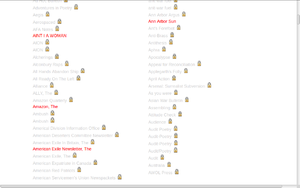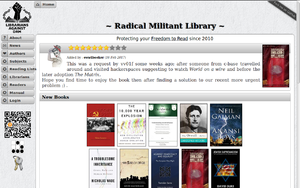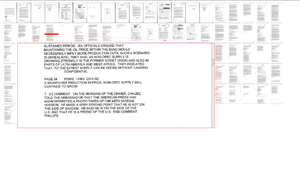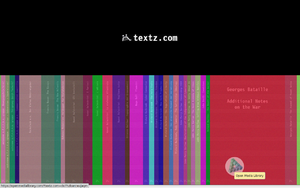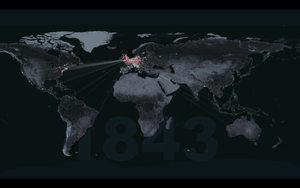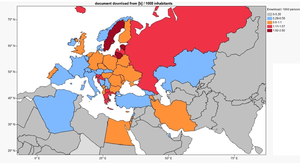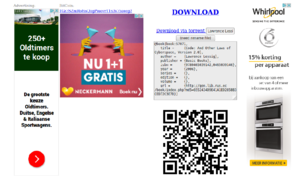Interfacing the law (2017)
Interfacing the law
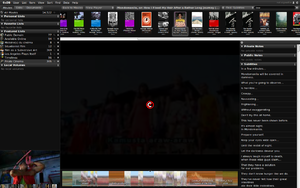
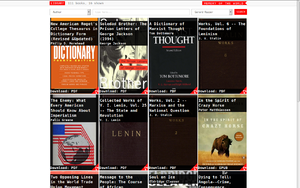
How can the right to access to knowledge be held up against claims of copyright? How can we battle the terror of the mind produced by the current intellectual property regime? Interfacing the law is an attempt to build a series of platforms, both in the sense of on-line interfaces and of public discourse, that allow us to experiment with, to openly discuss and to reflect while the next wave of court cases is waiting to happen. It is urgent that we find ways to make the public debate transcend the juridical binary of illegal vs. legal, and claim political legitimacy for acting out the potential of digital publishing, and the possibility of sharing digital books.
With reading and publishing increasingly turning digital, libraries are struggling to maintain their exceptional role as public access-providers to knowledge. There are few technical limitations that prevent anyone access to books from anywhere, but the legal reality for lending and borrowing digital texts is complicated.
Shadowlibraries such as Monoskop, aaaaarg, Sci-hub, Libgen and various onion-sites operate in this gap, not incidentally often at the margins of the rich academic institutions of the West. They collect and distribute electronic texts freely, serving readers materials that otherwise would not be affordable or accessible. In addition, many of these initiatives propose collections and selections that make a difference to what is generally available via mainstream platforms.
Pirate libraries are the products of readers (and sometimes authors), academics and laypeople, all sharing a deep passion for the book, operating in a zone where there is little to no obstacle to the development of the “ideal” library. As such, pirate libraries can teach important lessons on what is expected of a library, how book consumption habits evolve, and how knowledge flows around the globe.[1]
Readers outside institutions as well as university researchers have come to rely on shadowlibraries but no matter how critical these resources have become, it is still hard to speak out for them publicly. The recent court case of Elsevier vs. Sci-hub and Libgen[2] and another one underway against aaaarg[3] shows the vulnerability of such parallel digital knowledge infrastructures that sometimes have been around for decades. While each of them takes a different political stance, in the end of the day their various forms of civil disobedience count only as illegal action.
One of the problems that we have when we try to understand piracy is that it often does not fit within any of these existing categories, and there is a positivity or excess in the body of the pirate that cannot be disavowed.[4]
The Open Access and Free Culture movements for example, deploy the little space available in current intellectual property law in an attempt to reform intellectual property frameworks. The fierce industry that has grown around intellectual property, but also the dependency of the discourse on classical terms of representation, limits the available space to question what kinds of access should be available to whom, how individual authorship is framing social and cultural conditions, and how knowledge and property are being conflated in the current legal regime. These questions seem to regain importance in times of austerity and the privatisation of education, but also when we attempt to confront the colonial patterns in knowledge production and distribution.
Viewed through a proprietary lens, an author's intellectual expression is an object that is owned like any other. In the context of a market economy, it is simply a commodity to be exchanged and exploited in the marketplace. Nonetheless, the language of “ownership,” “property,” and “commodity” obfuscates the nature of copyright's subject matter, and cloaks the social and cultural conditions of its production and the implications of its protection.[5]
Biblioleak, crowdsourcing, extra-legal publishing, bibliothèque sauvage, shadow library, piratical text collection, popular resource sharing method, peer-acy, amateur digital library, bibliogifting, uneasy sharing, peer produced library ... if only judged by the many euphemisms, it is clear that there exists a vibrant extra-legal practice of rethinking the terms of property, authorship and practices of knowledge distribution in the age of the digital library. Always paradoxical or even incoherent, these practices can take the form of explicit projects (see sample projects), or relate to the set of choices any individual makes on a daily basis: what (not) to download, share and distribute; what to consider normal, brave, necessary or too risky. Interfacing each in their own way with legal and political frameworks, we could consider those multi-scale practices as experiments with the social contracts that link libraries, librarians, readers and books.
This is why projects like aaaaarg, ubu, monoskop and the others are so crucial at the moment because they point to a different future, different not only from today's monopolies but also from tomorrows.[6]
In collaboration with librarians, lawyers, activists and archivists, we invite participants to design or redesign on-line or software interfaces to extra-legal collections of digital texts. In order to develop the projects technically and conceptually, we will learn from historical activism and civil disobedience against the law in other areas such as housing and explore the contents of massive text-collections available in pirate, shadow, extra-legal and amateur digital libraries.
Interfacing the law is developed by Constant in collaboration with Memory of the World. The project is part of Society for Library Access (SLAX), a coalition of people and organisations that want to publicly address the antagonism between the access to knowledge and the current copyright regime.
Brief
For this third Special Issue, we will work in four groups/duos, where each group develops an on-line or software interface to a collection of extra-legal documents.
These “interfaces” can take the form of a collective annotation system, digital document analyses, portable bibliothèque sauvage, re-publication of digital content, library tool, mirrored server, on-line catalog ... The projects will be presented at a public event in Het Nieuwe Instituut on 15 June 2017.
Each group can decide to mirror one or more existing collections (see: sample collections) or curate their own. This project is first of all concerned with the problematics of the digital library but that does not mean the collections need to be confined to “books”.
Think about who has access (who can upload? who can download?), the political positioning of the project (how does it place itself in relation to copyright, knowledge access?), the formats and types of content hosted (what is included and excluded? for who is this collection? how and under what conditions were these files made?), where will the collection be stored (who hosts, where, under what conditions?), privacy and security ... and, of course, the law.
Sample libraries
- #icanhazpdf https://twitter.com/hashtag/icanhazpdf?src=hash
- aaaaarg http://aaaaarg.fail
- Bibliotheca http://bibliotecha.info/
- Clockwise libraries https://clockwise3rldkgu.onion
- Library Genesis http://gen.lib.rus.ec
- Memory of the world http://library.memoryoftheworld.org
- Monoskop http://monoskop.org
- On Our Backs http://voices.revealdigital.com/cgi-bin/independentvoices?a=cl&cl=CL1&sp=BEBJBJCA&ai=1&e=-------en-20--1--txt-txIN---------------1
- Project Gutenberg http://gutenberg.org
- Radical Militant Library (Jotunbane’s Reading Club) https://c3jemx2ube5v5zpg.onion
- Sci-hub http://sci-hub.bz
- Textz.com http://www.textz.com
- https://bibliotik.me
- volafile.io
- #bookz on IRCHighway/undernet
- The Piratebay @ Worm http://thepiratebay.worm.org
- UBU-web http://ubu.com
Reading
- Bodó, Balázs (2015): Libraries in the post-scarcity era. in: Porsdam (ed): Copyrighting Creativity: Creative values, Cultural Heritage Institutions and Systems of Intellectual Property, Ashgate https://pure.uva.nl/ws/files/2341818/162448_Libraries_in_the_post_scarcity_era.pdf
- Dockray, Sean (2017): Interface, Access, Loss (notes for a talk) http://www.academia.edu/11966098/Interface_Access_Loss
- Elbakyan, Alexandra (2016): Why Science is Better with Communism? The Case of Sci-Hub (transcript) https://openaccess.unt.edu/symposium/2016/info/transcript-and-translation-sci-hub-presentation
- Fuller, Matthew (2003): The impossibility of interface in: Behind the Blip: Essays on the Culture of Software, Autonomedia, London http://library.memoryoftheworld.org/b/EHMMo3RXjfw0tmPOtE7XPTg8bunNCB0mRx3EQF1uG0ttQHT9
- Liang, Lawrence (2011): Beyond Representation: The Figure of the Pirate. in: Access to Knowledge in the Age of Intellectual Property https://library.memoryoftheworld.org/b/of1rvTzBysuXEZlcc_hx4CLOZfb-PpTddh0eHkuIuqof1ou7 p.353-354
- Maigret, Nicolas & Roszkowska, Maria (2015): Chapter 2: Insider Perspective The Warez Scene in: The Pirate Book http://thepiratebook.net
- Mars, Marcell, Zarroug, Manar & Tomislav Medak (2015): Public Library http://library.memoryoftheworld.org/b/VG3cDMIz71e2XFDqYEBSat1erDCbmCz9cv2xuitazr_oJsRX
- Meister, Andre (2013): Interviews with e-book pirates on: Netzpolitik.org https://netzpolitik.org/2013/interviews-with-e-book-pirates-the-book-publishing-industry-is-repeating-the-same-mistakes-of-the-music-industry
+
- Acker, Kathy, Mckenzie Wark, I am very into you (correspondence 1995-1996) (2015) http://pzwart1.wdka.hro.nl/~femke/ifl/I%27m%20Very%20Into%20You_%20Correspondence%201995--19%20-%20Kathy%20Acker.pdf
Video + film fragments
- Brian Knappenberger, The Internet's Own Boy: The Story of Aaron Swartz (2014) "follows the story of programming prodigy and information activist Aaron Swartz (...) a personal story about what we lose when we are tone deaf about technology and its relationship to our civil liberties." https://archive.org/details/TheInternetsOwnBoyTheStoryOfAaronSwartz
- Cornelia Sollfrank, Giving What You Don't Have (2012-2015) "I realised how limited the discourse on appropriation is and shifted the question from what artists can TAKE, to the question of what artists can GIVE, in the sense of what they can contribute to the free circulation of art and culture." http://artwarez.org/projects/GWYDH/ (interview with Andrea Francke, Eva Weinmayr, Piracy Project)
- Welcome to the scene, Episode 01 (2004) "They are revered, reviled, hunted and admired. No one knows who they are - at least, not as far as they know." http://www.welcometothescene.com/
- Jamie King, Steal this film II (2007) "If Steal this film II proves at all useful in bringing new people into the leagues of those now prepared to think 'after intellectual property', think creatively about the future of distribution, production and creativity, we have achieved our main goal." http://footage.stealthisfilm.com/browse (interview with Lawrence Liang)
- Simon Klose, TPB AFK: The Pirate Bay Away from Keyboard (2013) "How did Tiamo, a beer crazy hardware fanatic, Brokep a tree hugging eco activist and Anakata, a paranoid cyber libertarian, get the White House to threaten the Swedish government with trade sanctions?" https://www.youtube.com/watch?v=eTOKXCEwo_8
Programme
Tuesday 4 april @ PZI + WORM
- 11:00-13:00 Introductions: who, why, what, how. Programme, background, introduction to the reading + sample projects (Femke, Aymeric, Michael).
- 14:00-17:00 Collective research: which projects, what politics. Together we will select a dozen sample projects, finding out about their positions, conditions, assumptions for publishing, technical set-ups, design-choices. Findings will be documented on the PZI-wiki (Femke, Aymeric, Michael)
- 20:00 @ Worm: Tour of The Worm Pirate Bay, Frédéric Van de Velde followed by a selection of film- and video fragments (The Scene, The Internet's Own Boy, TPB AFK, Giving What You Don't Have, Steal this film I + II, ...). Ends at 22:00, popcorn served!
Monday 10 april @ HNI
- 11:00 Welcome + Intro Femke Snelting (Constant, Brussels)
- 11:10 Bodo Balasz + Zoltan Puha (UvA, Amsterdam)
- 12:00 Dubravka Sekulic (IZK, Graz)
- 12:30 Katia Truijen + Hetty Berends (HNI, Rotterdam)
- 13:00 Aymeric Mansoux (XPub, Rotterdam)
- 13:30 Lunch
- 14:30-16:00 Discussion
- 16:15-17:00 Meeting with Xpub students
Tuesday 11 april @ PZI
- 11:00-17:00 Workshop on extra-legal publishing with Dubravka Sekulic. Collective annotation of the re-digitised publication I'm Very into You, based on an e-mail exchange between Kathy Acker and Mckenzie Wark (Femke)
Wednesday 12 April @ pzi & Thursday 13 April @ pzi - Bibliotecha
- XPUB 1 - Andre Bibliotecha installation
- XPUB 1 - 10-16 Bibliotecha hacking:
Tuesday 18 april @ PZI
- 11:00-17:00 Workshop on interfaces, with Michael Murtaugh. Interfacing digital collections: archiving vs publishing; streaming vs storing; upload vs download; privacy and security, protocols. (Femke)
Tuesday 25 April @ PZI
- Spring holidays / May vacation
Tuesday 2 May @ PZI
- 11:00-13:00 Project proposals: groups present their collections, have drawn up a workplan, i.e. technical learning, retro-planning, budget. (Femke, Aymeric, Michael)
- 14:00-15:00 Collective reading of Liang, Lawrence (2011): Beyond Representation: The Figure of the Pirate. in: Access to Knowledge in the Age of Intellectual Property + preparation discussion May 16.
- 16:00-16:00 Presentation Zalán Szakács
- 16:00-18:00 Tutorials
- 16:00 Kimmy + Emily
- 16:30 Margreet
- 16:45 Nadine
- 17:15 Franc + Max + Gulia
Tuesday 9 May @ PZI
11:00-17:00 Development (Michael and André Castro, Aymeric in and out)
https://pad.pzimediadesign.nl/p/ifl.pzimeeting_090517
- bash scripts
- PDF manipulation
- OCR
Tuesday 16 May @ PZI
- 11:00-13:00 Development (Femke on-line, Michael, Andre)
- 15:00-18:15 On-line tutorials https://meet.jit.si/interfacingthelaw
- 15:00 Poortgebouw Autonomous Archive
- 15:30 Food regulation libraries
- break
- 16:30 Youtube copyright and piracy
- 17:15 The Commuting Library
Tuesday 23 May @ HNI
- 11:00-13:00 Presentations with special guest Marcell Mars. Participants discuss their progress so far.
- 14:00-15:00 Meeting with Katia Truien (HNI) and tour through Architecture of Appropriation.
- 15:00-17:00 Tutorials with Femke and Marcell Mars.
Tuesday 30 May @ PZI
- 11:00-17:00 Workshop with performer, dancer and choreographer Varinia Canto Vila. Based on verbs such as could, should, can, should not, we test the limits and possibilities of engageing with public and private spaces. “The verb should denote directives or obligation. The verb could, refers to possibility under a certain condition. It alludes to a possibility of actualization, and from a movement perspective, one could say it captures a certain potentiality. And the verb can is capacity and being allowed to. Each of these verbs put the body in motion within a different intentionality, which as well could have a direct effect in the degree of movement.”
Tuesday 6 June @ PZI
- 11:00-17:00 Development (Michael and Aymeric)
Tuesday 13 June @ PZI
- 11:00-13:00 Development (Michael)
- 14:00-17:00 Tutorials (Michael, Femke)
Wednesday 14 June @ HNI
- 11:00-12:00 Meeting, with Rosemary Grennan
- 12:00-17:00 Installing @ HNI (Femke, Rosemary)
Thursday 15 June @ HNI
- 11:00-13:00 Discussing projects, finishing installation (Femke, Severine, Rosemary)
- 14:00-16:00 Discussion projects, finishing installation (Femke, Severine, Rosemary)
- 17:00-19:00 Public event, presentations projects. With: Severine Dusollier + Aymeric Mansoux
Friday 16 June @ PZI
- 11:00-12:00 On-line discussion with special guest Lawrence Liang, Alternative law forum (Bangalore).
- 13:00-15:00 Graduation buffet @ KINO
Biographies
Balázs Bodó feat. Zoltan Puha
Bodó Balázs is an economist, piracy researcher at the Institute for Information Law (IViR) at the University of Amsterdam.
Before moving to the Netherlands, he was deeply involved in the development of the Hungarian internet culture. He was the project lead for Creative Commons Hungary. He is a member of the National Copyright Expert Group. As an assistant professor at the Budapest University of Technology and Economics, he helped to established and led the university’s Masters Program in Cultural Industries. He has advised several public and private institutions on digital archives, content distribution, online communities, business development. His academic interests include copyright and economics, piracy, media regulation, peer-to-peer communities, underground libraries, digital archives, informal media economies. His most recent book is on the role of P2P piracy in the Hungarian cultural ecosystem.
Varinia Canto Vila
Varinia Canto Vila (Santiago de Chile, 1976) graduated as a dancer from the Conservatory of Arts - Universidad de Chile and from P.A.R.T.S in 1999. In 2014, she graduated from Goldsmiths University where she undertook an MA in Art & Politics. She has mainly worked as a dancer-performer for Meg Stuart / Damaged Goods in Highway 101 (1999) and Violet (2011); for Lilia Mestre in Unnoticed, for Rachid Ouramdane, Claire Croizé, Marcos Simoes, Metter Edvardsen, and Thomas Steyaert and Raul Maia.
In her recent work Cartographers, Varinia Canto Vila sees laws and norms as a matrix that creates divisions and borders – physical and existential – Rhis work attempts to map a territory through choreography. In this legal territory, gesture and movement become the cartographers, making visible how the legal and the normative are preset frames for our paths.
André Castro
André Castro is a media artist, with a background in sound art and experimental music. His recent practice deals with digital publications, offline digital libraries (bibliotecha.info), MIDI songs, and chatbots.
André is a 2013 alumnus of the MMDC program and has previously studied under the Sonic Arts MA at Lansdown Centre for Electronic Arts (Middlesex University, UK).
Currently André is a tutor at the Piet Zwart Institute.
Séverine Dusollier
Severine Dusollier is Doctor in Law of the University of Namur (Belgium). Before joining the SciencesPo faculty, she was a Professor in the University of Namur, where she taught intellectual property, IT law, property, competition law and media law. She was the Director of the CRIDS (Research Centre in Information, Law and Society), gathering more than 40 researchers engaged in a wide area of technology-related issues, from sociology, philosophy, communication to law and economy. As a researcher at CRIDS from 1996, she has carried out research in several European and national projects, namely for the Belgian Government, WIPO, the Council of Europe, UNESCO, the European Commission and Parliament.
Her current research relates to intellectual property, copyright and mainly on IP limitations, the public domain and the commons. She is particularly interested in the deviations of the traditional IP models, such as the shift from exclusivity to its subversion or dilution, or the transformation of the unique and self-contained authorship to connected multiple authors.
Severine Dusollier got awarded an ERC Consolidator Grant (2014-2019) on the topic of inclusive rights in property and intellectual property.
Rosemary Grennan
Rosemary Grennan works at the Mayday Rooms in London, a safe haven for historical material linked to social movements, experimental culture and the radical expression of marginalised figures and groups. It was set up to safeguard historical material and connect it with contemporary struggle. Its home, the Birmingham Daily Post’s former London office at 88 Fleet Street, was refurbished over 2012-13 to facilitate collective gatherings and allow fluid connections between users of the building, its archives, and various digital platforms for dissemination.It offers communal spaces – a reading room, a meeting and screening room and a canteen – where this material can be explored and researched, to activate its potential in relation to current struggles and informal research. Rosemary is currently studying for a PhD in Anthropology at UCL.
Lawrence Liang
Lawrence Liang is a legal researcher and lawyer based in the city of Bangalore, who is known for his legal campaigns on issues of public concern. He is a co founder of the Alternative Law Forum, and by 2006 had emerged as a spokesperson against the politics of "intellectual property". His family is of Chinese origin but settled down in Kolkata many years ago.
Liang's key areas of interest are law, popular culture and piracy. He has been working closely with Sarai, New Delhi on a joint research project Intellectual Property and the Knowledge/Culture Commons. Liang is a "keen follower of the open source movement in software", Lawrence Liang has been working on ways of translating the open source ideas into the cultural domain. Segments of an interview with Liang commenting extensively on copyright and culture are featured in Steal This Film (Two).
Liang is author of "Sex, laws and Videotape: The Public is watching" and "Guide to open content licenses," published by the Piet Zwart Institute in 2004.
Aymeric Mansoux
Aymeric Mansoux research deals with the defining, constraining and confining of cultural freedom in the context of network based practices. His past and current collaborations spawn across the creation of festivals and conferences (Le Placard, make art, FREE?!), music and sound works (0xA, Raid Over Moscow, stmsq1), installations (Go Forth & *, Hello Process, Meshy), software (Puredyne GNU/Linux) as well as collectives and communities (GOTO10, La Société Anonyme, 80c), books (FLOSS+Art, Elastic Versailles) and all sorts of workshops related to media, net, generative, software art and culture.
His latest collaborations are Naked on Pluto (VIDA award [ES]), with Marloes de Valk and Dave Griffiths, a project that aims at unfolding the issues of software mediation in the context of privacy and communication within a proprietary and commercial social network such as Facebook; and The SKOR Codex (Japan Media Arts Festival award [JP]), with La Société Anonyme, a limited edition of eight hand bound books of raw data dumps that mimic NASA’s Golden Disc Record, aiming at documenting the life at a Dutch institution before it ceased to exists with the 2012 Dutch art funding cuts.
He is currently a PhD candidate at the Centre for Cultural Studies, Goldsmiths, University of London [UK] under supervision of Prof. Matthew Fuller, researching on the creative misunderstandings between art, politics and the law within free culture. He regularly publishes essays and papers linked to his ongoing research: http://bleu255.com
Marcell Mars
Marcell is one of the founders of Multimedial Institute - mi2 and net.culture club mama in Zagreb. He initiated GNU GPL publishing label ' EGOBOO.bits, TamTam platform for on-line collaboration, Ngode software for NGOs financial management.
He initiated skill sharing regular informal meetings of enthusiasts in mama + started skill sharing's satellites g33koskop and 'The Fair of Mean Equipment'.
Marcell participated in collaborative artistic projects like NRD Kit of NRD Van group of artists, gifoskop (interactive animation) together with Nikolina Pristas & Maja Marjancic + was a tech developer for projects EditThisBanner (by Lina Kovacevic) and Flying Carpet (by Lala Rascic).
He was one of the organizers of summer camps "Otokultivator" on island Vis (together with URK Močvara & EASA Croatia) and SummerSource (together with TacticalTech).
Marcell participated in curating or producing mi2 yearly exhibitions I Am Still Alive (2001) and re:Con (2002), free culture, science and technology festival Freedom to creativity! (2005) and in conceptual exhibition System.hack() (2006). He is a member of Creative Commons Team Croatia.
Regularly runs workshops like 'Programming for non-programmers', 'Social software and semantic web in practice', 'Command line audio on GNU/Linux'... Gives talks on topics like hacking, free software philosophy, gathering communities around good causes, slacking, doing nothing, stupid/smart business models of music industries, social software & semantic web...
While in Zagreb Marcell hangs out in Hacklab in mama, in Belgrade runs Wonder of technology/Čudo tehnike, Hackers lenses/Hakerska optika and Programming for non-programmers at Faculty of Media and Communication, from 2011-2012 worked on research Ruling Class Studies at Jan Van Eyck in Maastricht, a research continued in 2015 as PhD at Digital Cultures Research Lab. In 2013 did fellowship at Akademie Schloss Solitude in Stuttgart. These days he advocates for and works on Public library.
He sings, dances, tells stories and makes music as Nenad Romic za Novyi Byte.
Michael Murtaugh
Michael Murtaugh completed his undergraduate degree in Computer Science and Electrical Engineering at the Massachusetts Institute of Technology (’94). Subsequently he was part of the Interactive Cinema group, led by Glorianna Davenport at the MIT Media Lab where he completed a masters degree (’96). His research focus was on building tools for “Evolving Documentaries”, or how traditional film/video model evolves in the context of digital networked media such as the Web.
Currently Michael teaches in the Master Media Design and Communication programme at the Piet Zwart Institute. He is a member of Constant, a Brussels based collective engaged in the fields of free and open source software, feminism, copyright alternatives, and collaborative networks. With Constant he is currently working on Active Archives, a platform for diverse material ranging from texts to images and video. Seeing the project as both technical and cultural, the system facilitates, re-use of material while enriching content through metadata, vocabularies, and taxonomies. Next to these activities, Murtaugh is the founder of automatist.org, a new media design firm specialised in community databases, interactive documentary, and tools for new forms of reading and writing online.
Dubravka Sekulic
Dubravka Sekulic is an architect and researcher focusing on the topics of transformation of public domain in the contemporary cities, commons and spatial justice, and spatial implications of neoliberal planning. Her book "Glotzt nicht so Romantisch! On Extralegal Space in Belgrade" was published in 2012, by Jan van Eyck Academie. Together with Žiga Testen, and Gal Kirn she co-edited the book “Surfing the Black” about Yugoslav black wave cinema published by Jan van Eyck in Spring 2012.
In 2012, together with Andrej Dolinka and Katarina Krsti? she curated a show “Three points of support: Zoran Bojovi?” at Museum of Contemporary Arts in Belgrade, with the focus on African and Middle Eastern projects of Bojovic and their relation to Non-aligned Movement. Together with Branko Belacevic, Jelena Stefanovic, Marko Miletic and Srcan Prodanovic she authored exhibition and book “Peti park - Struggle for Everyday” about the struggle of a community for a park in Belgrade.
She is working on a book “Planning for the Unexpected – Sourcebook for Urban Struggle” based on the experiences of regional Right to the City initiatives, for which she was awarded artistic research grant by Royal Art Institute, Stockholm, Sweden.
Dubravka exhibited and lectured about her work across the globe, including at aut.innsbruck (at), Stroom, the Hague (nl), Superfront, Los Angeles (USA), AA, London (UK). She graduated architecture at Faculty of Architecture, University of Belgrade, where she was a lecturer. She was an East European Exchange Network fellow at Akademie Schloss Solitude, Stuttgart, Germany and a design researcher at Jan van Eyck Academie, Maastricht, The Netherlands.
Femke Snelting
Femke Snelting develops projects at the intersection of design, feminism and Free Software. She works with and for Constant, a Brussels-based association for arts and media that generates performative publishing, curatorial processes, poetic software, experimental research and educational experiments in local and international contexts.
With Constant, she co-initiated the design/research team Open Source Publishing (OSP) and the Libre Graphics Research Unit to investigate the way digital tools and creative practice might co-construct each other.
With Jara Rocha, she currently develops Possible Bodies, an ongoing collaborative research on the very concrete and at the same time complex and fictional entities that "bodies" are. Through inventories, performative experiments and texts they ask what matter-cultural conditions of possibility render them present, especially in contact with the technologies, infrastructures, and techniques of 3D tracking, modeling and scanning.
She collaborated with Renée Turner and Riek Sijbring as De Geuzen (a foundation for multi-visual research), employing a variety of tactics to explore female identity, narratives of the archive and media image ecologies.
In 2015 Femke was an Art, Science and Business fellow at Akademie Schloss Solitude and currently she teaches at The Piet Zwart Institute (Media Design: experimental publishing, Rotterdam) and a.pass (advanced performance and scenography studies, Brussels).
http://snelting.domainepublic.net/
Zalán Szakács
Zalán Szakács is a Netherlands based multi-disciplinary designer with a keen interest in the culture of libraries. Born in the heart of the Carpathian mountains in Transylvania, and grown up in Austria, the multicultural environment influences his conceptual design projects, which balance between something that is sensitive and brutal at the same time. He adapts a multidisciplinary approach to explore the boarders of the creative fields. Currently studying in the 4th year at the Design Academy Eindhoven in the Man and Communication (Media and Culture) department.
Notes + traces
Projects
http://145.24.221.83:8080/browse/search?query=mediawiki
Poortgebouw Autonomous Archive
Giulia, Franc, Max, Colm
https://pad.pzimediadesign.nl/p/studioPrla_todolist To do list
Media Wiki from rpi
Workflow
Brainstorm
Material
The Commuting Library
Emily + Kimmy
https://pad.pzimediadesign.nl/p/ifl.thecommutinglibrary
Food regulation libraries
Nadine + Karina
Description here: https://pad.pzimediadesign.nl/p/desription-food-lib
https://world.openfoodfacts.org (maybe the api info: https://www.programmableweb.com/api/open-food-facts/sdks)
→ skeleton
→ SPECIAL ISSUE 03 // INTERFACING THE LAW
Youtube copyright and piracy
Clàudia
Research on Youtube copyright. I did the same empirical research that Scott Smitelli did in 2009, and compared it.
[PDF with my study https://pzwiki.wdka.nl/mw-mediadesign/images/1/1a/Youtube-copyright.pdf] [Link to Scott Smitelli study 2009 http://www.scottsmitelli.com/articles/youtube-audio-content-id]
Documentation
10/06/2017: A day at the library
- Documents: http://pzwart1.wdka.hro.nl/~femke/ifl/a_day_at_the_library/
- Presentation Bodo Balasz: https://prezi.com/4wrlpc7xd3mn/hush-hush-it-is-a-pirate-library/
- Pictures: http://gallery.constantvzw.org/index.php/Interfacing-the-law
Pad Paradise
- https://pad.pzimediadesign.nl/p/ifl.screening
- https://pad.pzimediadesign.nl/p/interfacing_the_law-tools
- https://pad.pzimediadesign.nl/p/ifl.samplelibraries
- https://pad.pzimediadesign.nl/p/ifl.hnimeeting_100417 A day at the library (Het Nieuwe Instituut)
- https://pad.pzimediadesign.nl/p/ifl.pzimeeting_110417 in the HUB
- https://pad.pzimediadesign.nl/p/ifl.pzimeeting_180417 in the HUB
- https://pad.pzimediadesign.nl/p/ifl.pzimeeting_020517 in the HUB
- https://pad.pzimediadesign.nl/p/ifl.pzimeeting_090517
- https://pad.pzimediadesign.nl/p/ifl.iamveryintoyou
- https://pad.pzimediadesign.nl/p/BeyondRepresentation
- https://pad.pzimediadesign.nl/p/marcelmars
- https://pad.pzimediadesign.nl/p/ifl.pzimeeting_230517
- https://pad.pzimediadesign.nl/p/ifl.hnimeeting_140617
Git hell
References
- ↑ Balázs Bodó, Libraries in the post-scarcity era (2015)
- ↑ https://torrentfreak.com/sci-hub-tears-down-academias-illegal-copyright-paywalls-150627/
- ↑ https://www.gofundme.com/aaaaarg
- ↑ Lawrence Liang, Beyond Representation: The Figure of the Pirate (2011)
- ↑ Carys J. Craig, Joseph F. Turcotte, Rosemary J. Coombe, What's Feminist about Open Access? A relational approach to copyright in the academy (2011)
- ↑ Felix Stalder, Nettime (2016)
This page (?) is copyleft Constant (?) 2017, available under a Free Art Licence http://artlibre.org/licence/lal/en/

